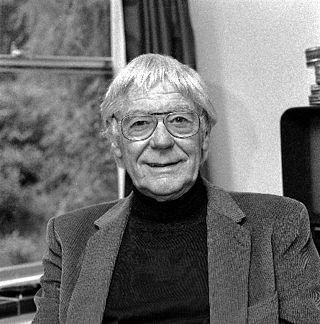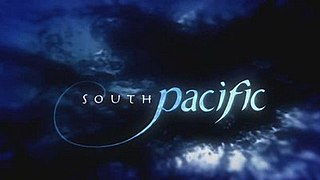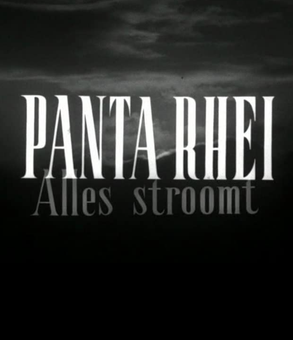
Desmond John MorrisFLS hon. caus. is an English zoologist, ethologist and surrealist painter, as well as a popular author in human sociobiology. He is known for his 1967 book The Naked Ape, and for his television programmes such as Zoo Time.

Dame Jane Morris Goodall, formerly Baroness Jane van Lawick-Goodall, is an English primatologist and anthropologist. She is considered the world's foremost expert on chimpanzees, after 60 years' studying the social and family interactions of wild chimpanzees. Goodall first went to Gombe Stream National Park in Tanzania to observe its chimpanzees in 1960.

Franciscus Bernardus Maria de Waal was a Dutch-American primatologist and ethologist. He was the Charles Howard Candler Professor of Primate Behavior in the Department of Psychology at Emory University in Atlanta, Georgia, director of the Living Links Center at the Yerkes National Primate Research Center at Emory, and author of numerous books including Chimpanzee Politics (1982) and Our Inner Ape (2005). His research centered on primate social behavior, including conflict resolution, cooperation, inequity aversion, and food-sharing. He was a member of the United States National Academy of Sciences and the Royal Netherlands Academy of Arts and Sciences.

Happy Feet is a 2006 animated jukebox musical comedy film directed and produced by George Miller and written by Miller, John Collee, Judy Morris, and Warren Coleman. It stars the voices of Elijah Wood, Robin Williams, Brittany Murphy, Hugh Jackman, Nicole Kidman, Hugo Weaving, Anthony LaPaglia, Magda Szubanski and Steve Irwin. An international co-production between the United States and Australia, the film was produced at Sydney-based visual effects and animation studio Animal Logic for Warner Bros. Pictures, Village Roadshow Pictures, and Kingdom Feature Productions. It is the first animated film produced by Kennedy Miller and Animal Logic. Set in the cold land of Antarctica, the film follows Mumble (Wood), an emperor penguin who is able to tap dance brilliantly despite his lacking the ability to sing the heartsong to attract a soul mate. After being continuously ridiculed and rejected by peers and his own father (Jackman), Mumble departs on a journey to learn what is causing the local fish population to decline — and to find himself along the way.

March of the Penguins is a 2005 French feature-length nature documentary directed and co-written by Luc Jacquet, and co-produced by Bonne Pioche and the National Geographic Society. The documentary depicts the yearly journey of the emperor penguins of Antarctica. In autumn, all the penguins of breeding age leave the ocean, which is their normal habitat, to walk inland to their ancestral breeding grounds. There, the penguins participate in a courtship that, if successful, results in the hatching of a chick. For the chick to survive, both parents must make multiple arduous journeys between the ocean and the breeding grounds over the ensuing months.

Cinema of the Netherlands refers to the film industry based in the Netherlands. Because the Dutch film industry is relatively small, and there is little or no international market for Dutch films, almost all films rely on state funding. This funding can be achieved through several sources, for instance through the Netherlands Film Fund or the public broadcast networks. In recent years the Dutch Government has established several tax shelters for private investments in Dutch films.

A nature documentary or wildlife documentary is a genre of documentary film or series about animals, plants, or other non-human living creatures. Nature documentaries usually concentrate on video taken in the subject's natural habitat, but often including footage of trained and captive animals, too. Sometimes they are about wildlife or ecosystems in relationship to human beings. Such programmes are most frequently made for television, particularly for public broadcasting channels, but some are also made for the cinema. The proliferation of this genre occurred almost simultaneously alongside the production of similar television series which is distributed across the world.

Albert Haanstra was a Dutch director of films and documentaries. His documentary Glass (1958) won the Academy Award for Documentary Short Subject in 1959. His feature film Fanfare (1958) was the most visited Dutch film at the time, and has since only been surpassed by Turkish Delight (1973).

NHNZ, formerly Natural History New Zealand, is a New Zealand-based television production house.

Encounters at the End of the World is a 2007 American documentary film by Werner Herzog about Antarctica and the people who choose to spend time there. It was released in North America on June 11, 2008, and distributed by ThinkFilm. At the 81st Academy Awards, the film was nominated for Best Documentary Feature.
The Human Dutch is a 1963 Dutch documentary film directed by Bert Haanstra, about the daily lives of people in the Netherlands. It was a big success in the Netherlands with almost 1.7 million admissions, the third most successful Dutch film at the time. It was nominated for an Academy Award for Best Documentary Feature. It was also selected as the Dutch entry for the Best Foreign Language Film at the 37th Academy Awards, but was not accepted as a nominee.

Anthonie "Anton" Koolhaas was a Dutch journalist, novelist, and scenario writer.

South Pacific is a British nature documentary series from the BBC Natural History Unit, which began airing on BBC Two on 10 May 2009. The six-part series surveys the natural history of the islands of the South Pacific region, including many of the coral atolls and New Zealand. It was filmed entirely in high-definition. South Pacific was co-produced by the Discovery Channel and the series producer was Huw Cordey. It is narrated by Benedict Cumberbatch. Filming took place over 18 months in a variety of remote locations around the Pacific including: Anuta, Banks Islands, French Frigate Shoals, Papua New Guinea, Palmyra, Kingman Reef, Tuvalu, Palau, Caroline Islands, Tuamotus and Tanna Island in Vanuatu.

Survival is one of television's longest-running and most successful nature documentary series. Originally produced by Anglia Television for ITV in the United Kingdom, it was created by Aubrey Buxton, a founder director of Anglia TV, and first broadcast in 1961. Survival films and film-makers won more than 250 awards worldwide, including four Emmy Awards and a BAFTA.
Human Ape is a 2008 National Geographic documentary film on the genetic and evolutionary origins of human behavior, and covers the genetic and behavioural similarities and differences between humans and other great apes. The award-winning independent production company Pioneer Productions of London was commissioned by National Geographic Channels International to produce Human Ape.

Bernhard Droog was a Dutch actor who appeared in 17 films, including the 1997 Academy Award-winning Character, and numerous television and theatre roles. Droog was a recipient of the Order of Orange-Nassau in 1970.

The 14th annual Berlin International Film Festival was held from 26 June to 7 July 1964.

Naresh Bedi is an Indian filmmaker, the eldest of the Bedi Brothers and a member of the second generation of three generations of Wildlife photographers and filmmakers. He is the first Asian to receive a Wildscreen Panda Award and the first Indian to receive a wildlife film nomination for the British Academy Film Awards. He was honoured by the Government of India in 2015 with Padma Shri, the fourth highest Indian civilian award.

Panta Rhei is a Dutch short documentary film by Bert Haanstra, first shown in 1952. It portrays the motions of nature, edited rhythmically with alternating footage of water, clouds and vegetation, sometimes using time-lapse photography. It was Haanstra's fourth film as director and like many of his early films it does not feature any humans. The title is a Greek phrase associated with the philosopher Heraclitus and the concept that everything is in a constant state of becoming something else. The film competed at the 1952 Cannes Film Festival. Critics have highlighted its rhythmicality and vision of nature.

















